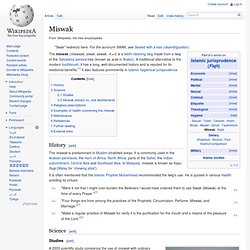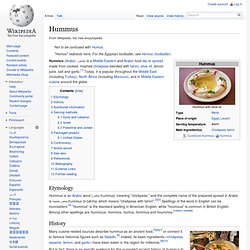

Food Comparison. How to Keep Feces Out of Your Bloodstream (or Lose 10 Pounds in 14 Days) Ruh-roh.

(Photo: Toby Otter) Following our Paleolithic ancestors, our Neolithic ancestors lost an average of six inches in height. Most people now have those last 5-10 pounds that seem impossible lose. The causes for both, surprisingly, may be the same. Robb Wolf can explain. I have known of Robb for several years, but I only met him through a friend a week ago. Enter Robb Wolf. A Common Problem Below I describe several people who at first glance appear different, but in fact they all share a common problem. For you, this chapter may represent the “missing link” in your quest for improved performance and health. Miswak. The miswak (miswaak, siwak, sewak, السواك) is a teeth cleaning twig made from a twig of the Salvadora persica tree (known as arak in Arabic).

A traditional alternative to the modern toothbrush, it has a long, well-documented history and is reputed for its medicinal benefits.[1] It also features prominently in Islamic hygienical jurisprudence. History[edit] The miswak is predominant in Muslim-inhabited areas. It is commonly used in the Arabian peninsula, the Horn of Africa, North Africa, parts of the Sahel, the Indian subcontinent, Central Asia and Southeast Asia. In Malaysia, miswak is known as Kayu Sugi (Malay for 'chewing stick').
It is often mentioned that the Islamic Prophet Muhammad recommended the twig's use. Science[edit] Studies[edit] Traditional miswak sticks. Dr. Miswak extract vs. oral disinfectants[edit] Religious prescriptions[edit] A pack of miswak sticks. The use of the miswak is frequently advocated in the hadith (the traditions relating to the life of Muhammad). Hummus. Etymology Hummus is an Arabic word (حمّص ḥummuṣ) meaning "chickpeas," and the complete name of the prepared spread in Arabic is حمّص بطحينة ḥummuṣ bi ṭaḥīna, which means "chickpeas with tahini".[2][3] Spellings of the word in English can be inconsistent.[4] "Hummus" is the standard spelling in American English, while "houmous" is common in British English.

Among other spellings are hummous, hommos, humos, hommus and hoummos. [citation needed] History Hummus Many cuisine-related sources describe hummus as an ancient food,[5][6][7] or connect it to famous historical figures such as Saladin.[8] Indeed, its basic ingredients—chickpeas, sesame, lemon, and garlic—have been eaten in the region for millennia.[9][10] Nutritional information Serving methods Hummus ful (pronounced [ˈfuːl]) is topped with a paste made from fava beans boiled until soft and then crushed.
Syria and Lebanon Hummus topped with whole chickpeas and olive oil.